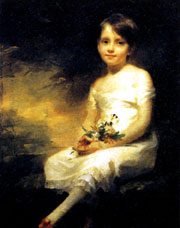GirlChat #606035
The Dangerous Lesson of Lolita Literalism
Posted by Dante on Friday, November 21 2014 at 06:36:18AM
In reply to Discuss: Lolita and child liberation posted by EthanEdwards on Thursday, November 20 2014 at 04:57:34AM
|
Lolita, is, of course a fiction.
While not as abstract and unrealistic as the Beat novels of William S. Burroughs or the weirdness of Kurt Vonnegut Jr. it is definitely not aiming to be read as a heavily researched and literal account of Pedophilia. Taking its metaphorical and unrealistic "Pedophilia" literally leads not just to unwarranted assumptions about the author and intention, not just to unrealistic claims about Pedophiles; it leads to an immoral position on the status of Lolita herself. While downplayed in both films, Lolita is not an external person with her own wants and needs, she is a projection of Humbert's desires and guilt. And, since Quilty is also NOT an independent personality, but a reflection and projection of Humbert, Lolita's relationship to the two is not that of a real girl to a Pedo. Humbert's ambivalence and guilt towards his own desires create a Lolita who is ambivalent and sometimes angry about Humbert's attentions. But the OTHER Humbert of the book, the Quilty who refuses to feel "Guilty" ( as the name implies ) is a amoral hedonist who projects, and therefore creates an amoral hedonistic Lolita. And what ultimately outrages Humbert about his nemesis is that while Lolita's feelings towards Humbert are conflicted and vacillating her love for the remorseless Quilty is overt and total. It all makes perfect sense when we recognize, as all literary analysts do, that Humbert is a classical unreliable narrator. Lolita is purposefully obscured to the point that she has no discernable inner life. We only see of her what Humbert wishes to have us see. Nabokov has called Humbert a monster and vain. So it is only appropriate that this selfish creature imagines that the sexual element was initiated by a knowing Lolita who supposedly learned this from "boys at camp." But since she only responds as a reflection of Humbert's desires or Quilty's, even this is suspect. It is all well and good for a novel to have characters who serve only as reflections of the protagonist, to shatter their psyche into many parts. But those who read Lolita literally do so at the peril of any real ethics that recognizes agency in others. And unlike most novels using this device in a straightforward manner, Lolita is exceptionally perverse to be read literally. For it tells us that the Pedo who has moral qualms will be a source of harm. But the Pedo who is hedonistic and amoral will allow the girl to feel love and to ultimately free herself and grow independent. In RL, it is the other way around. But since Lolita isn't about girls or Pedophiles, nobody should attempt to draw ethical lessons from it. Certainly not the dangerous lesson derived from a novel in which a Pedophile claims to be responding to a girl when there is no girl who can be seen outside of a projection of his own fantasies. People claim that Pedos do this often enough; seeing only what we want to see or even fantasize. We should probably avoid attempting to draw moral guidelines from "case studies" of girls who are reduced to nothing but a figment of a Pedo's desires; even if he is a self-loathing Pedo. The fantasies of the self-loathing are just as dangerous a substitute for reality as the fantasies of the self-accepting or even the amoral. Because ultimately all these lessons we derive are played out with other real people who are never projections. Dante  |
Follow ups: